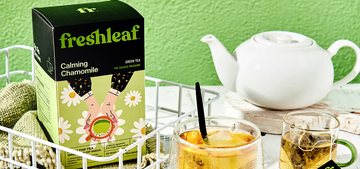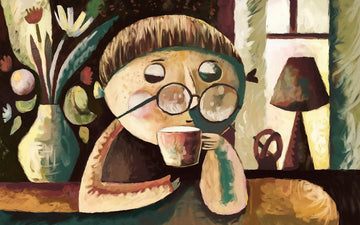Is tea good for kids? A Parent's Guide to Herbal, Caffeine-Free Teas
by Lovlesh Saini on Feb 04, 2025
Should Kids Be Drinking Tea?
If you’re a tea lover, chances are you’ve wondered whether your child can enjoy a warm, comforting cup too. Maybe they’ve seen you sipping your favorite herbal blend and asked for a taste. Or perhaps you’re looking for a natural alternative to sugary drinks. However, that is a wide topic, so right now, we’ll find the answer to the question: Are teas good for children?
The answer? Yes and no.
While traditional teas like black, green, and oolong contain caffeine (which isn’t ideal for kids), there’s a whole world of caffeine-free herbal teas that can be safe and beneficial for children. In fact, some herbal teas can help with digestion, sleep, and immunity, making them a great addition to a child’s diet when chosen carefully.
So, how will we go through it? Which teas are good for kids, why they work, and how to introduce your kids to tea that too safely.
Why Herbal, Caffeine-Free Teas Could be a Great Choice for Kids
1. Kids Should Not Consume Caffeine!
Caffeine is a stimulant that affects sleep, concentration, and even heart rate. Since kids have smaller bodies and developing nervous systems, they’re more sensitive to caffeine’s effects. That’s why herbal, caffeine-free teas are the best bet.
2. High Sugar Drinks Are Not Good for Kids!
Unlike sugary juices and sodas, herbal teas provide hydration without artificial flavors, excessive sugar, or preservatives. Some blends also have added benefits like boosting immunity, aiding digestion, or calming restlessness.
3. Teas can Help with Digestion Problems!
Certain herbal teas like chamomile, fennel, and ginger help soothe an upset stomach, ease bloating, and promote healthy digestion, something every parent appreciates!
4. Teas can Help you Relax!
Children can have trouble winding down, but herbal teas with calming properties can make bedtime easier. Ingredients like chamomile, lavender, and lemon balm promote relaxation and better sleep.
5. Some Teas can Boost your Immunity as well!
Many herbal teas contain antioxidants, vitamins, and antibacterial properties that can help strengthen a child’s immune system. Ginger, rooibos, elderberry, and hibiscus teas are packed with nutrients that keep colds and infections at bay.
Best Herbal, Caffeine-Free Teas for Kids
Not all herbal teas are created equal. Some are safe and beneficial for children, while others should be avoided. Here’s a list of the best caffeine-free teas for kids and why they’re great:
1. Chamomile Tea – A Great Tea for Calming Kids
Why it’s good: Chamomile tea is famous for its calming effects. It can help reduce anxiety, promote better sleep, and soothe upset stomachs.
How to serve: Brew a weak chamomile tea and let it cool slightly before serving. Perfect as a bedtime drink!
You can even try to brew our Freshleaf Calming Chamomile Tea, try to keep it mild, brew 2 cups from 1 tea bag, that will do the trick.
Best for: Restless nights, hyperactivity, mild stomach issues.
2. Peppermint Tea – The Best Tea for Energy and Soothing Yourself
Why it’s good: Peppermint tea is known for its digestive benefits. It helps with bloating, gas, and mild stomach discomfort.
How to serve: Brew a weak cup of peppermint tea and let it cool before giving it to your child.
Well, even though you can try Freshleaf’s Moroccan Mint tea, we’d suggest against it, cause it has a minimal amount of caffeine in it. Even though this amount won’t hurt we’d still suggest that you try to avoid caffeine with your kids.
Best for: Stomach aches, nausea, digestion.
3. Lemon Tea – The Best Tea for Relaxing the Mind
Why it’s good: Lemon balm has mild sedative properties, which help with anxiety and hyperactivity. It also supports digestion and promotes restful sleep.
How to serve: Brew a light lemon balm tea and serve it warm.
Well, we do have a category for lemon tea, I mean, our Lemon Honey Tea, however, again, it does have little caffeine content in it, so be cautious while giving it to kids!
Best for: Anxiety, hyperactivity, sleep issues.
4. Ginger Tea – The Best Tea for Better Immunity
Why it’s good: Ginger has anti-inflammatory and antimicrobial properties, making it a great choice for strengthening immunity and fighting off colds.
How to serve: Brew a light ginger tea and mix it with honey for extra flavor (for children above one year old).
You can try our Turmeric Ginger tea, it has the healing properties of turmeric and ginger and is caffeine free, so it can be a great choice for your kids!
Best for: Immunity, colds, nausea.
Teas to Avoid for Kids
While herbal teas are generally safe, some should be avoided due to their strong medicinal properties or potential side effects. Here are a few teas to keep away from your child’s cup:
Black Tea – High in caffeine, not suitable for kids.
Licorice Root Tea – This tea can affect blood pressure in large amounts.
Echinacea Tea – Can trigger allergic reactions in some children.
Ginseng Tea – This tea can be too stimulating for young ones.
How to Introduce Herbal Tea to Children
-
Start with small amounts. A few sips at first to see how they react.
-
Brew it lightly. Avoid making the tea too strong.
-
Serve it warm, not hot. Lukewarm tea is ideal for kids.
-
Skip the sugar. Most herbal teas have a mild natural sweetness, but you can add a tiny bit of honey to make it sweet yet healthier.
-
Make it fun! Use colorful cups or serve tea with a straw to make it exciting.
Should Kids Drink Tea?
Well, as long as it’s herbal and caffeine-free, kids can drink tea! However, we'd still advice that you keep it as minimal as possible!
Herbal teas can be a great way to keep children hydrated while offering health benefits like better digestion, improved sleep, and stronger immunity. However, always choose mild, kid-friendly options and introduce them gradually.
So, next time your child wants to share a tea moment with you, go ahead, brew a gentle, herbal, caffeine-free tea, and enjoy a cozy, healthy tea time together!


